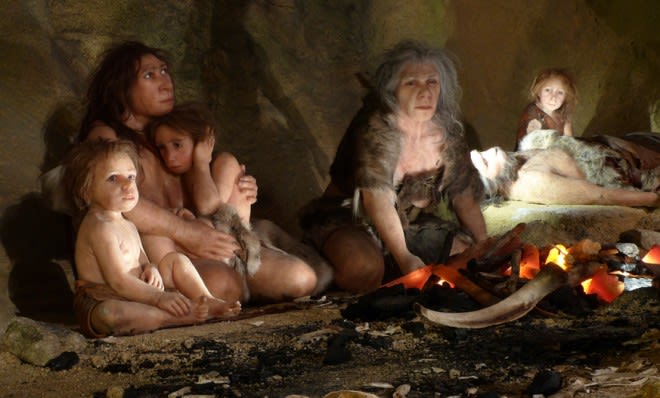5 things you probably didn't know about Neanderthals - Neanderthals had family sex, great eyes, and a terrible time hunting varmints - Our thick-browed, extinct friends known as the Neanderthals have been all over the news lately. The latest find? Scientists at the Max Planck Institute for Evolutionary Anthropology in Leipzig, Germany, have sequenced and published a high-quality Neanderthal genome taken from a toe bone found in a Siberian cave, reports the Associated Press. In celebration of the breakthrough, here are 5 fascinating things about Neanderthals that you may not have known:

1. They kept sex all in the family
When scientists put a 100,000-year-old skull from China’s Nihewan Basin together, they found something curious on top of it — a hole. An uncovered "soft spot" should be rare, yet researchers have found 22 Neanderthal skulls with a similar defect, leading them to believe that "the simplest explanation is that small and unstable human populations forced our ancestors to inbreed," according to Smithsonian Magazine. Yes, inbreeding is normally linked to cognitive problems, but it's better than watching your species die out in the icy Pleistocene era. You know what they say: If you can't be with the one you love, breed with the one you're with.
2. They had great vision and terrible social skills
Neanderthals' brains were about the same size as our own. So why weren't they able to adapt? A study led by Robin Dunbar of the University of Oxford found a possible answer in their large eye sockets. Neanderthals may have been forced to devote a lot of their brain power to their eyesight to see in the dim, foggy north. It's possible that it limited the development of their frontal lobes, making it so "they could only maintain a social group size of around 115 individuals, rather than the 150 that we manage," according to New Scientist.
If they had been able to socialize better, they might have survived. Dunbar's colleague, Eiluned Pearce, told Discovery News that "smaller social groups might have made Neanderthals less able to cope with the difficulties of their harsh Eurasian environments because they would have had fewer friends to help them out in times of need."
3. They had trouble catching pesky rabbits — possibly a fatal flaw
Neanderthals were great at hunting mammoths. Rabbits? Not so much. That's the conclusion reached by John Fa, biologist at the United Kingdom's Durrell Wildlife Conservation Trust, who found that rabbit remains only started showing up in Europe 30,000 years ago — around the time Neanderthals started to disappear and our human ancestors started taking their place. The study points out that "as climate change or human hunting pressure whittled down populations of Iberian large animals such as woolly mammoths, rabbits would have become an increasingly important food resource," according National Geographic. For whatever reason, the theory goes, Neanderthals couldn't adjust.
4. Scientists think we could bring them back to life
That genome data in Germany could come in handy if scientists ever want to bring a Neanderthal back to life. According to National Geographic, we could do it by embracing the Jurassic Park method: Tweak a human cell to match Neanderthal DNA, and implant it in a chimp or human mother. "Going from engineered cells to whole organism has been especially well established in mice, and [there's] no obvious reason why it would fail in other mammals," Harvard geneticist George Church tells National Geographic. We assume they will all look and act like Saturday Night Live's Unfrozen Caveman Lawyer.
5. They were extreme travelers
You wouldn't think that short, big-boned Neanderthals would do a lot of running and walking, but a new study suggests that they covered a lot of ground. According to ScienceNews, the study found "a dearth of older individuals in fossil samples suggesting that life spans were limited due to the rigors of constant travel, and an absence of skeletal injuries in excavated fossils that would have prevented vigorous movement." A possible reason for all that roaming: They were looking for suitable rocks to put on the ends of their spears, says David Nash of the University of Brighton. ( The Week )
Blog : Live Old Memories
No comments:
Post a Comment